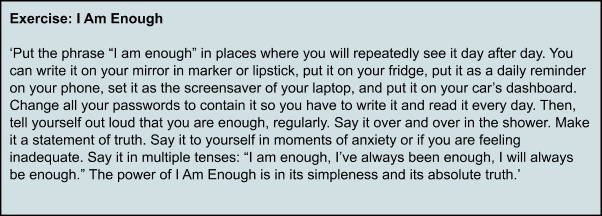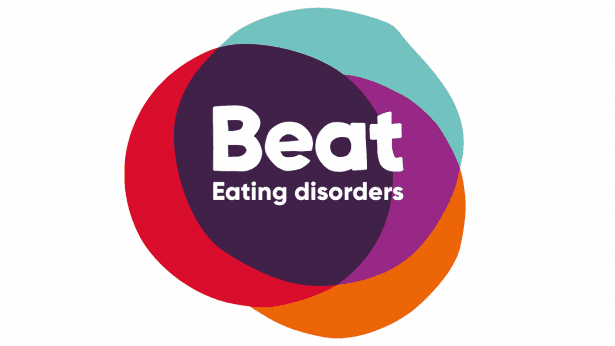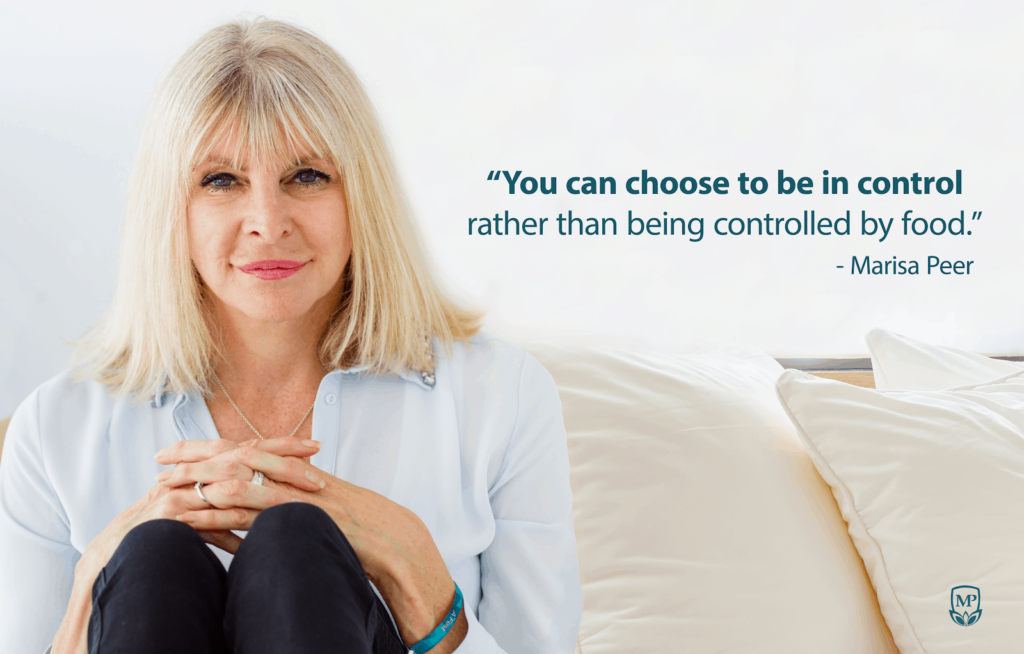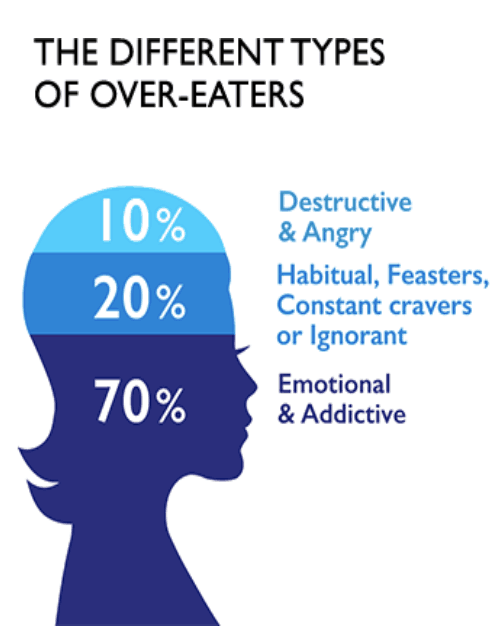Have you ever felt insecure? Lacking self esteem? Or like no matter how hard you try, it’s never good enough?
You are not alone. We all have. Even Nicole Scherzinger—who appears to ‘have it all’: beauty, talent, fame and fortune—is just like the rest of us. She has also struggled with the insecurities of not feeling good enough and not fitting in.
According to celebrity superstar therapist Marisa Peer, after years of working with clients all over the world, she believes that this feeling of not being enough effects all of us and is often the root cause of many other problems. Marisa says:
‘I believe that the common denominator of almost everyone’s issues is that, somewhere along the way, they learned that they weren’t good enough. Not loveable enough, successful enough, talented enough, perfect enough or good enough to be accepted and loved unconditionally.’
The outside perspective can be very different to how we feel inside

In an interview with Cosmopolitan magazine, Nicole said: “I get past my shyness by making everything about others and not thinking about myself. That’s what I did on The X Factor—I can be goofy and playful when it’s about the acts. They are like my babies. But when I’m off stage I’m not as big and animated. People know they could have a pint with me, they know I work hard… but for me all my smiles and confidence are a triumph because it came from a broken place.’
Nicole shared her personal story and inner challenges to help other people realise that they are enough just as they are. In a recent video for The Child Mind Institute, Nicole opened up about her struggles with not feeling good enough:
‘Growing up I really struggled with feeling like I fit in. I even had a hard time feeling like I fit into my own skin. I was just really hard on myself. I had a lot of struggles with self-esteem and a lot of insecurities. Later on that resulted in me having eating disorders because of my body dysmorphia. I was just really hard on myself growing up. I just… didn’t like myself much.’
‘What would I tell my younger self?

When you go through those struggles and challenges, it’s going to be preparing you and protecting you. Even though you don’t feel like you fit in—you are not supposed to fit in—you are supposed to stand out.
Just hold on, don’t give up. Don’t let anyone else—not even yourself—get in the way of who you are and who you were created to be. You are enough. You are worth it. That you are perfect just the way that God made you and that you have great purpose in this world. Just wait and see.’
“You are enough. You are worth it”

‘I have watched over and over how a simple, profound, and life-changing mantra of ‘I am Enough’ can build self-love and eliminate any limiting beliefs forever. ‘I Am Enough’ is the most powerful statement of truth I have taught millions of people all over the world to use to transform their lives. When you truly believe you are enough, your life will improve in the most amazing ways.’
I Am Enough
Marisa’s latest book ‘I Am Enough’ and accompanying on-line course explains this further and provides practical techniques anyone can use to transform lives. She shares:
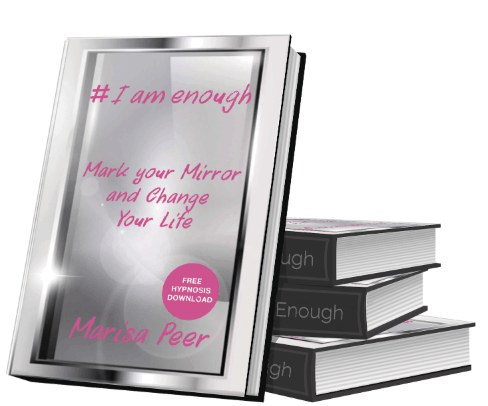
I Am Enough is designed to help you massively increase your own sense of self-worth so that you like yourself, feel good about yourself and believe in yourself. It helps you permanently break free from self-sabotage and self-destructive thought patterns and behaviors, so you can live a happy, motivated and confident life, not just sometimes but all the time.’
Here is a free and easy exercise anyone can do from the book I Am Enough:
Change your words to change your life
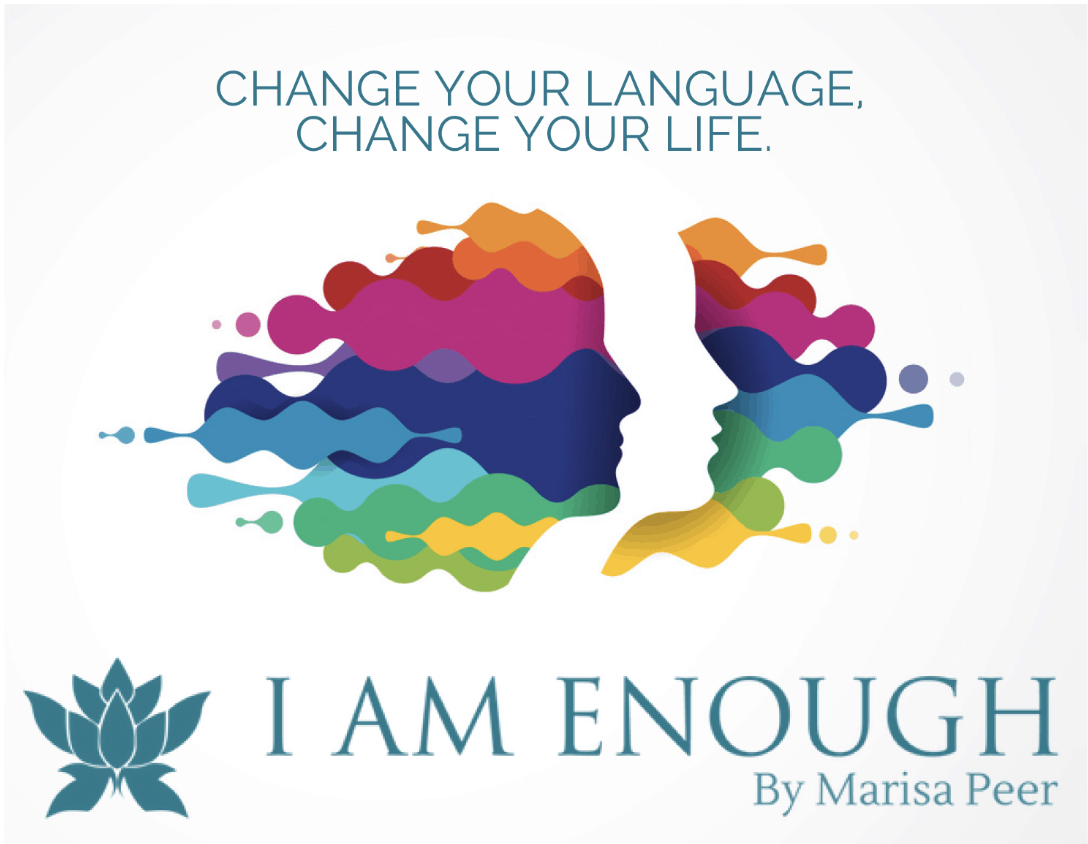
‘I thought, ‘I’m going to lose everything I love if I don’t love myself.’ One day when you feel like you’ve reached the end, you just say, ‘I’m not doing this anymore.’ It’s sad to see how I wasted my life. I had such a great life on the outside, the Dolls were on top of the world but I was miserable on the inside. I’m never letting that happen again; you only get one life—I was 27 only once.’
Nicole also shared how hard it was to hide her eating disorder: ‘I didn’t think anyone knew in my group or in my family because I hid it that well, I was so ashamed. I knew it wasn’t normal or healthy because I was hurting myself through this cycle of disordered eating. It was my drug, my addiction. It’s an endless vicious cycle.’
Now 40 years old, Nicole can look back on being 27 with a wisdom and knowing that comes from overcoming our biggest challenges. Whilst she now talks about being fully recovered and says ‘I’m more accepting of my body now,’ she can share the lessons she learnt as a result of going though such a challenging experience. To the outside world, Nicole was a beautiful, confident, successful women with an idyllic lifestyle, but inside she had a difficult battle on her hands.
Nicole shares her struggles with eating disorders
‘Thinking about it, I try not to well up… It is such a horrible paralysing disease and it was such a dark time for me. That’s why I can empathise so much with people who have demons and voices in their heads, who aren’t nice to themselves. It robs you of living your life.
But you can recover and you can get rid of it forever. I did it and that’s why it’s so important for me to share my story. I felt so alone… but I made myself so alone. You hide it from the world, you isolate yourself. But you can beat it—do not give up because you’re so special and you’re meant for such great things.’
You can BEAT eating disorders
BEAT the UK’s leading charity supporting those affected by eating disorders showed to support Nicole sharing her story, saying:
‘It is an extremely brave thing to talk about and we really do appreciate Nicole bringing her story to the attention of the general public. Her positive story of recovery is such an important message to tell people about, to let them know that recovery is both achievable and possible.’
Beat provides valuable information and supportive helplines, which people can call, text or email, plus a UK wide network of self help and support groups, online support and an online directory of support services.
Eating disorder awareness
Research suggests that 1 in 20 people will develop an eating disorder during their lifetime. In the UK alone, it is estimated that between 1.25 and 3.4 million people are affected by an eating disorder and 75% of these are women.
The latest version of the DSM (Diagnostic Statistic Manual of Mental Disorders) cites the main eating disorders as anorexia, bulimia and binge eating disorder (BED).
Marisa Peer also shares her story to help others
‘I spent over twenty years dieting and trying to be thinner, but never quite making it. I wasted years obsessing about my weight, turning down invitations to dinner parties because the only way I could eat less was not to be around food. I drove my partner crazy because I would not go to office parties or functions in case I ate too much. I was scared of food and had almost no control over my consumption of it, constantly craving sugar and carbohydrates.
I spent my teens and twenties obsessed with food and preoccupied with my weight. Then, when I began to study hypnotherapy while living in Los Angeles, I discovered there is another way, an easier way. I realise now, that back then I did not know how to have a healthy and enjoyable relationship with food and now that I do, I want everyone to have the same freedom of a healthy body and mindset.
I wish I had known then what I know now, which is why I am so passionate about sharing. The ground-breaking discoveries I made and now share with others, came from my own experience and over thirty years of working with clients on their relationship to food and body confidence, first in gyms as a personal trainer and nutritionist, then later as a therapist on television, the radio and in my own clinic.
It was my success in helping people achieve dramatic weight improvements and curb overeating that led me to become the therapist on Celebrity Fit Club in England and America. I became known as an expert in the field of weight management and worked with many high-profile clients from actors to athletes, royalty to rock stars, helping them to achieve phenomenal results.
The techniques I now teach others moved me from someone with a weight problem and a very unhealthy obsession to someone who maintains my perfect weight easily and effortlessly. I am now clear on the food I rate and the food I hate. I eat better than ever, and I also no longer have the frequent headaches, sinus problems or lethargy that I lived with for years.’
Eating disorders can affect anyone

‘You cannot tell if someone has an eating disorder just by looking at them. While it is true that some sufferers of anorexia are severely emaciated, some are not, and the majority of eating disorder sufferers do not have anorexia. Those suffering from bulimia may be within the normal weight range or may be overweight, while those with binge eating disorder are often overweight.
Professor John Morgan at Leeds Partnership NHS Foundation Trust designed the SCOFF screening tool to indicate a possible eating disorder. A score of two or more positive answers is a positive screen.

Anorexia has the highest mortality rate of any psychiatric disorder, from medical complications associated with the illness as well as suicide. Bulimia is associated with severe medical complications, and binge eating disorder sufferers often experience the medical complications associated with obesity. In every case, eating disorders severely affect the quality of life of the sufferer and those that care for them.
Is it possible to recover from an eating disorder?
We are lucky enough to work with some very inspirational people and we hear some very uplifting stories of recovery. Research suggests that around 46% of anorexia patients fully recover, a 33% improving and 20% remaining chronically ill. Similar research into bulimia suggests that 45% make a full recovery, 27% improve considerably and 23% suffer chronically.’
Marisa Peer, who has helped thousands of people overcome issues with eating, says:
‘Sometimes simple changes have the most powerful results.
Science has proven 95% of diets are ineffective, as people put the weight back on (and more) within a year. This is because other methods are focused on the wrong thing!
There is always an emotional reason for overeating and it’s usually for comfort when people are stressed, unhappy, vulnerable or bored. In my online program, Perfect Weight Forever, people learn how they could overcome this by understanding the root cause. Over 70% of overeaters are emotional and addictive eaters. Another 20% are habitual and ignorant eaters, and 10% are angry eaters.
You cannot heal what you don’t feel.
You need to know what sort of eater you are before you can address the problem, which is something that no amount of diets, pills or surgery can do.
Over 70% of overeaters are emotional and addictive eaters. Another 20% are habitual and ignorant eaters, and 10% are angry eaters.
Emotional eaters use food to soothe unhappy feelings and to temporarily solve anger, loneliness, and unhappiness because eating temporarily switches off their negative emotions.
The key emotional states that send you into emotional eating are anger, hurt, loneliness, betrayal, frustrations, jealousy, guilt, resentment, shame, helplessness, powerlessness, stress, tiredness and many others that may be more subtle. However, eating will never cure these feelings, it just makes them worse.
In this revealing interview, I share my own personal story and how from 14-30 years old, I was always starving, denying myself and then binging, it was a form of torture.
I choose to feel great every day, eating healthy food at my perfect weight, helping thousands of other people do the same.
Negative eating habits really can be isolated and broken once and for all. You can change your relationship with food for good and finally say goodbye to unhealthy habits.’
Marisa Peer has spent over thirty years, researching and testing the most effective therapy techniques to create the phenomenally powerful RTT method to help people face their greatest challenges. Marisa reveals that ‘overeating is so often an emotional issue and dieting can’t fix that, but a form of therapy can, which is why Rapid Transformational Therapy®️ can be so effective. By making permanent emotional adjustments, you change from the inside as well as changing on the outside.
The adjustments and changes are often small and simple, but the benefits can be huge and life-changing. Plus the great thing about making mental changes is that it’s within your control. You can choose to be in control rather than being controlled by food.
Our minds have the most powerful potential on the planet, we just need to know how to harness our potential so our minds work with us, not against us. That’s why I am now sharing my methods with others, as I want everyone to benefit. When you develop something as powerful as Rapid Transformational Therapy™ (RTT™) you want the whole world to know about it and be able to use it to improve as many lives as possible.’
Rapid Transformational Therapy™ (RTT™)
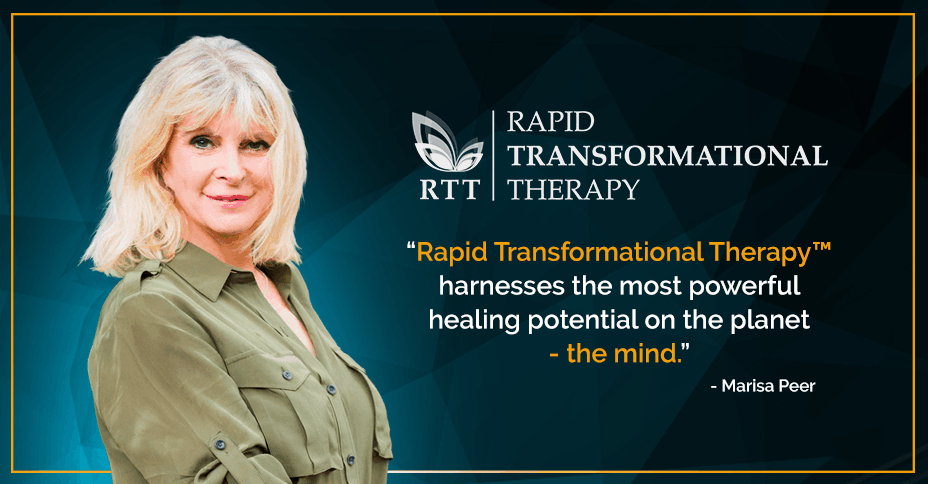
Rapid Transformational Therapy™ (RTT™) harnesses the most powerful healing potential on the planet – the mind. It enables you to communicate with your subconscious mind, to replace old limiting beliefs and behaviours and rewire your mind for success.
RTT™ is an award winning solution-based treatment, recognised globally as one of the most effective new therapies for achieving fast and permanent results. It is revolutionising the very concept of ‘therapy’ as you no longer have to spend years talking about your issues in an attempt to address them. Rapid Transformational Therapy achieves dramatic life changing results quickly and effectively and is now being taught to others, so that as many people as possible can benefit.
Marisa is now sharing these powerful techniques with the world, teaching Doctors, Therapists, Coaches and people with no prior experience who want to enjoy a successful career helping others and transforming lives. Marisa provides an intensive training program with live in person or on-line, with a support package to help people set up their own practises and businesses, so that anyone can learn how to rapidly transform lives effectively and permanently.
RTT™ has won numerous awards and accolades and continues to grow in global recognition as one of the most effective therapies available for achieving fast and permanent results. Rapid Transformational Therapy™ (RTT™) is endorsed by the General Hypnotherapy Register, Complementary and Natural Healthcare Council, the National and International Council of Psychotherapists, the American Board of Hypnotherapy, the International Association of Complementary Therapists, plus the International Institute of Complementary Therapies.
Please feel free to share this article with anyone who you think may benefit. If you would like to read more about health topics, please browse through our Health and Weight section on our blog page.
Sign up below to receive Wellness Weekly for free
We aim to share the most valuable resources, information and life-changing insight every week in our free Wellness Weekly digest. This is sent out to our 10k+ and growing community of readers every weekend. If there are particular topics you would like us to cover please let us know and you can register for free below.


